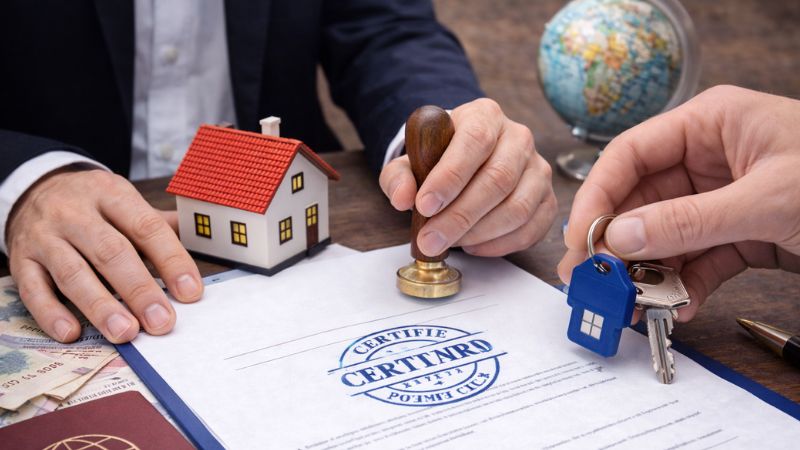Many Singaporeans buying properties abroad are overwhelmed by the amount of paperwork and checks involved. While various jurisdictions may have different requirements, buyers usually need their documentation to be notarised by a Notary Public for property documents in Singapore before they can complete the transaction. Below, we discuss the requirements for buyer documentation and explain how a notary for overseas property buyers can help simplify your paperwork.
Key Takeaways
- When purchasing properties abroad, buyers will usually need to have their documents notarised.
- In most cases, buyers need to notarise their proof of identity, financial documents, and statutory declarations. They will also need to notarise a Power of Attorney for property outside Singapore if they are not present during closing.
- In some jurisdictions, buyers may also need to have the Sales and Purchase Agreement (SPA) and transfer documents notarised.
- For Singaporean buyers of overseas properties, it is often easier and more efficient to notarise their documents in Singapore.
Paperwork Challenges When Purchasing Properties Abroad
Purchasing properties abroad often involves complex paperwork. Foreign sellers, their lawyers, brokers, and banks can be extra cautious when selling to overseas buyers and have additional requirements in place.
In most cases, the sellers will expect additional proof of the foreign buyers’ identities, their legal standing, and financial status. Typically, this involves the requirement to have the buyer’s documents notarised, including obtaining an apostille or full legalisation.
The Notarisation Process for Documents in Singapore
When you prepare your paperwork for use outside of Singapore, you will need to have it notarised by a Notary Public. The notary will check your documents and the copies you provide, and attach a Notarial Certificate confirming them as true copies of the original.
In Singapore, the notarisation process includes attaching a Notarial Certificate to each document and further authentication by the Singapore Academy of Law (SAL). When authenticating the documents, the SAL affixes an Apostille Certificate to the Notarial Certificate, which legalises the documents for use in countries that are members of the Hague Convention.
For non-Hague countries, you will need a full chain of legalisation, which includes further authentication by the Ministry of Foreign Affairs and the embassy or consulate of the respective country.
Property Documents That Need Notarisation
Typically, you can clarify which documents you need to notarise for purchasing properties abroad with your overseas real estate broker or lawyer. In most cases, the buyer needs to arrange for notarised copies of their proof of identity, financial documentation, statutory declarations, as well as the Power of Attorney, if needed.
Power of Attorney
If you are not present personally during the property transaction abroad, you will need to appoint a representative to act under a Power of Attorney. Your representative can sign documents on your behalf, make payments, and take other actions as needed to finalise the property transaction for you based on the authorisation you provide. In most cases, you will need to notarise the Power of Attorney and have it apostilled by SAL or ensure full legalisation when buying property outside of Hague Convention member countries.
Passport
When you provide a copy of your passport for property transactions overseas, you will usually need it notarised before closing. Importantly, you need to ensure your passport is valid on the date of making the transaction or even six months beyond that date, as this can be the requirement in some countries.
Other Proof of Identity
Besides your passport, in some countries you may also need additional proof of identity, for example, a national ID card or a driving license. In some cases, you may also need proof of residency, for example, copies of utility bills. Depending on the country where you buy overseas property and the seller, you may need to notarise these documents as well.
Financing and Mortgage Documents
When buying properties, you will be asked to provide proof of funds, which can be in the form of bank statements or a letter from your bank. If you use a mortgage or loan to finance your overseas property purchase from Singapore, you may need to have it notarised as part of your document package.
Statutory Declarations
In some jurisdictions, you will need to make statutory declarations or affidavits for property transactions, for example, when declaring that the information you provided is true. Similar to other documents for use abroad, you will need these declarations and affidavits notarised by a Notary Public in Singapore.
Other Property Documents Notarised Abroad
Depending on where your property is located, you may need other documents notarised as well. For example, you may need to notarise a Sales and Purchase Agreement, your signature on the agreement, or the deed of transfer with the Notary Public in the respective jurisdiction.
Certified Translations
Finally, if you buy property where English is not an official language, you will need an official translation of your documents. When you arrange the translation in Singapore, you may need to have the translator’s certificate, the Notarial Certificate, and the Apostille Certificate from the Singapore Academy of Law or a full chain of legalisation.
How IRB Law Can Help
The IRB Law notary team can provide you with comprehensive notarial services for notarising your documents for overseas property purchases from Singapore.
When you turn to our office for notarial service, we can help you:
- notarise copies of your passport and other proof of identity, financial documents, statutory declarations, mortgage or loan documents, and other documentation for purchasing overseas properties,
- arrange for an Apostille Certificate with the Singapore Academy of Law,
- organise a full chain of legalisation with the Ministry of Foreign Affairs and the embassy or consulate of the respective jurisdictions for properties outside of Hague countries,
- assist with the notarisation of certified translations of your documents when you purchase properties in non-English-speaking countries.
Conclusion
When you look to buy properties abroad, most often you will need to notarise your documents to proceed with the transaction. Sellers abroad may require foreign buyers to provide notarised proof of identity, proof of funds, a Power of Attorney, and other documents.
You may also need to see the local notary for overseas property buyers to notarise the Sales and Purchase Agreement and the transfer documents. If you need further assistance with your foreign property transactions or notarising your documents, please don’t hesitate to contact the IRB Law notary team for comprehensive notarial service.
FAQs
Do I need an apostille or legalisation for documents when purchasing properties abroad?
When notarising your documents for purchasing properties abroad, you will need an Apostille when buying properties in Hague Convention member countries and full legalisation for non-member jurisdictions.
What are the fees for notary services in Singapore?
The fees for property notary services in Singapore are fixed in the First Schedule of Notary Public Rules. In particular, the fee for certifying a true copy is $10 for the first page and $2 for each subsequent page where a seal is required.
When notarising copies of your documents, a Notary Public is required to issue a Notarial Certificate with the fee set at $75 per document. Additionally, the notarial process in Singapore includes obligatory authentication with the Singapore Academy of Law, which issues an Apostille Certificate at a cost of $87.20 per document.
What type of documents need notarisation for purchasing properties abroad?
The exact requirements for notarising documents when purchasing overseas properties depend on the particular jurisdiction where the property is located. Generally, buyers purchasing overseas properties may be required to notarise their passports and other proof of identity, a Power of Attorney, proof of funds, mortgage or loan documents, and statutory declarations. In some jurisdictions, the parties to the transaction also need to arrange for notarisation of the Sales and Purchase Agreement and transfer documents.




